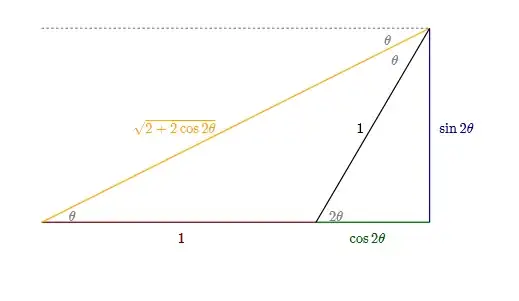How does one derive the following two identities: $$\begin{align*} \cos 2\theta &= 1-2\sin^2\theta\\ \sin 2\theta &= 2\sin\theta\cos\theta \end{align*}$$
-
Is the first one right? – Nana Apr 01 '12 at 15:01
-
whoops mistyped, editing now – Billjk Apr 01 '12 at 15:02
-
1In my experience, a very large percentage (if not all) of trigonometric identities can be deduced from the addition formulas, $\cos(\alpha+\beta) = \cos\alpha\cos\beta - \sin\alpha\sin\beta$ and $\sin(\alpha+\beta) = \sin\alpha\cos\beta+\cos\alpha\sin\beta$. – Arturo Magidin Apr 01 '12 at 20:40
-
1It seems everyone below is proving that $\cos2\theta=1−2\sin^2\theta$, which is what the OP wrote first. Why did you change it? – M Turgeon Apr 01 '12 at 21:01
-
@MTurgeon Just a typo. – Arturo Magidin Apr 01 '12 at 21:11
3 Answers
Hints:
For the $\cos 2\theta$ formula, use the sum identity (with $x=y=\theta$) $$ \cos(x+y)=\cos x\cos y - \sin x\sin y, $$ followed by the Pythagorean identity $\cos^2 x=1-\sin^2 x $.
For the $\sin 2\theta$ formula , use the sum identity (with $x=y=\theta$) $$ \sin(x+y)=\sin x\cos y +\sin y\cos x. $$
Or, for the $\cos2\theta$ formula and $0<\theta<\pi/2$, consider the diagram:

We have $$ \cos\theta ={ {1+\cos2\theta}\over\sqrt{2+2\cos 2\theta}}; $$ whence $$ \sqrt 2\cos\theta=\sqrt{1+1\cos\theta}, $$ or, $$ 2\cos^2\theta= 1+1\cos2\theta $$ From this, we have $$ 2-2\sin^2\theta=1+\cos2\theta, $$ or $$ \cos2\theta =1-2\sin^2\theta. $$
(Having this in hand, we could also use the diagram to derive the formula for $\sin2\theta$.)
- 74,748
-
-
1
-
-
@David Mitra Can you give me the multiple angle formula? I haven't found them in any website. – Asif Iqubal Apr 01 '18 at 09:38
$e^{i\theta}$ means the point with angle $\theta$ on the unit circle. Euler formula tells us that $e^{i\theta}=\cos \theta+i\sin \theta$. Then $e^{i2\theta}=\cos^2 \theta-\sin^2 \theta+2i\sin \theta\cos\theta$. Also, we know $e^{i(2\theta)}=\cos 2\theta+i\sin 2\theta$. Compare the real and imaginary parts, and you get the desired result.
All I assume is that you know Euler formula.
-
This is the easiest way to remember/derive it, but obviously one needs to know what complex numbers are. – M Turgeon Apr 01 '12 at 20:51
The first one follows from:
$$\cos 2\theta = \cos(\theta +\theta) = \cos \theta \cos \theta - \sin \theta \sin \theta = \cos^2 \theta - \sin^2 \theta .$$ Now use the fact $\cos^2 \theta + \sin^2 \theta =1.$
The second one follows from $$ \sin 2\theta = \sin(\theta +\theta) = \sin \theta \cos \theta + \cos \theta \sin \theta. $$
- 8,351